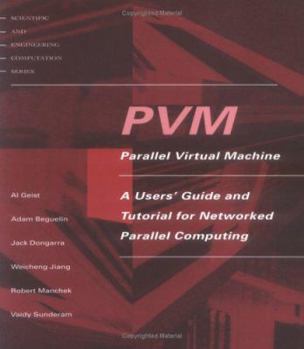Pvm: A Users' Guide and Tutorial for Network Parallel Computing
(Part of the Scientific and Engineering Computation Series)
Select Format
Select Condition 
Book Overview
Written by the team that developed the software, this tutorial is the definitive resource for scientists, engineers, and other computer users who want to use PVM to increase the flexibility and power of their high-performance computing resources. Written by the team that developed the software, this tutorial is the definitive resource for scientists, engineers, and other computer users who want to use PVM to increase the flexibility and power of their...
Format:Paperback
Language:English
ISBN:0262571080
ISBN13:9780262571081
Release Date:November 1994
Publisher:MIT Press
Length:299 Pages
Weight:1.23 lbs.
Dimensions:0.7" x 8.0" x 9.1"
Age Range:18 years and up
Grade Range:Postsecondary and higher
Customer Reviews
2 ratings
Parallelism APIs evolving
Published by Thriftbooks.com User , 18 years ago
The Parallel Virtual Machine abstraction assumes a message passing environment built from Unix machines. It's message passing primitives are a good deal simpler than MPI's, and the authors note that MPI can be effective as an under-layer for that part of PVM. Unlike MPI, however, PVM emphasizes heterogeneous computing ensemble built from whatever hardware is already at hand. What sets PVM apart from the others is its emphasis on the pragmatics of multi-computer coordination. More than the usual SPMD coordination, it has facilities for managing the ensemble. It even has facilities for signalling runaway processes and for recovering from lost nodes and other errors. And, although the authors note many system-dependent specifics, they address issues that arise in managing the server daemons, crossing administrative boundaries, and other pragmatics of parallel computing. Most of the book is taken up with code samples and man pages for the PVM API. That gives it a very hands-on, practical feel, short on the philosophical and theoretical tone of other books on parallelism APIs. PVM doesn't depend on special compilers, so it's a bit easier for C programmers to approach than OpenMP is. And it's a compact API with just a few central concepts, mostly drawn from standard C idioms, so it's lot simpler that MPI. The book's mention of MasPar, Kendall Square Research, DEC, and Thinking Machines gives an antiquated sense, though. I'm not sure how common PVM is, these days, but if it's what you have, then this is the book for you. //wiredweird
So you want to build a super computer?
Published by Thriftbooks.com User , 18 years ago
I bought this book because I built a super-computer out of junk computers. I am writing a game based on Risk (the board game) that runs on all these machines. I decided I liked PVM better than MPI, because PVM doesn't require any special compilers and also it worked easier with SSH. Also it was easier to setup and use than MPI (IMHO). This book is a good tutorial and introduction to PVM but the problem is it talks alot about strange computers and things you will most likely never heard of (HIPPI,bit-vector computers). While it is cool stuff, it's pretty old now. But, PVM is still alot easier (IMHO) to get into than MPI. Or you can just roll your message passing code by hand using TCP/IP too.






